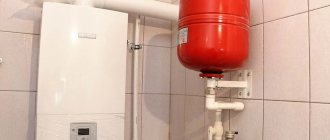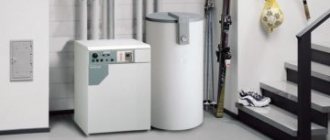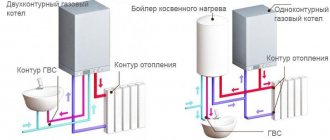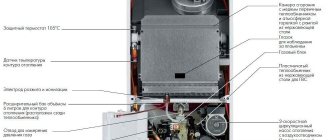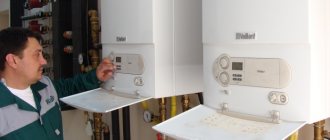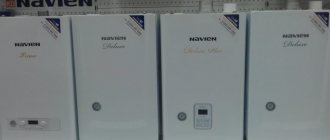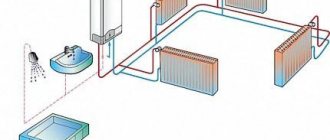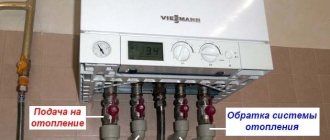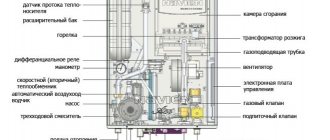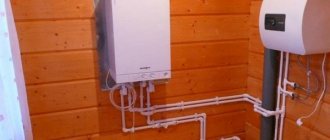Home |Useful articles |Double-circuit boiler in comparison with a single-circuit boiler and a gas water heater
Date: October 6, 2020
Comments: 1
In matters of water treatment in a private home, there is an eternal debate between universal and specialized approaches.
A universal view is to provide the home with heat and hot water using a double-circuit gas boiler that solves both problems simultaneously. The second option is specialization, when one unit (gas water heater) supplies hot water, and another (single-circuit boiler) handles home heating.
Specialists of the GradusPlus project, who have posted more than one material on their portal gradusplus.com about ways to save and optimize home heating, presented all the pros and cons of each of the schemes. They also determined why a single-circuit boiler and gas water heater are better and more comfortable, but not always.
What to buy for a house, apartment, technical room?
Many people may have a completely logical question - what is better, a boiler or a gas water heater? There is no answer to this question, since these devices differ in functionality. And you need to buy a device that will solve a specific technical problem in your case. Below we will look at the main selection and purchase scenarios.
Private houses are usually not connected to an autonomous heating system. The owner needs to supply it with both water and coolant. Therefore, for private homes, the best option is to purchase a gas boiler. The device is usually installed in the basement or in a special extension located on the same site next to the house. It's better not to save money on this device. After all, the device must have good technical characteristics, and its operation must be stable and long-term.
Apartment in a multi-storey building
Most apartments in multi-storey buildings are connected to autonomous heating, so you should buy a gas water heater for them. In this case, there is no practical benefit in purchasing a double-circuit boiler, since you are already supplied with heating. And such devices cost several times more. The speaker is usually placed in the bathroom or toilet. When choosing a device, it is recommended to focus on the nature of water consumption. The best purchase option is to have enough water from the device to fill the bathtub.
Utility room
Heating devices are also installed in technical rooms - in offices, shops, warehouses and so on. Which device should you choose in this case? The answer will depend on the location of the room:
When choosing, you should focus not only on the category of the device, but also on technical indicators - power, shelf life, volume and others. It is recommended to entrust installation to experienced engineers. Although if you have all the necessary skills and abilities, you can take on this task yourself.
Growing environmental consciousness forces us to look for energy sources alternative to solid fuel. The same is true for home heating, where people gradually began to abandon coal. Changes
Recently, autonomous heating systems have become increasingly popular. They allow you to be completely independent of how reliably and efficiently city utilities work. At
A gas holder is a special container designed to store a propane-butane mixture. The tank is installed directly near private houses. The flow of gas inside the boiler or to
To heat houses, boilers are used that burn fuel, heat the coolant and supply it to the heating system. However, in addition to installing the heating system, it is necessary to take care of its
Solid fuel boilers are used to heat a private home and supply it with hot water. They are installed in the basement or technical annex, and they work on wood, coal,
A gas water heater or boiler is used to heat the house and supply it with hot water. There are slight differences between these devices, which should be taken into account when choosing a device. IN
Source
Boilers with double heat exchanger
This is the most compact and inexpensive design solution. The gas burner heats one heat exchanger, divided into two independent sectors for hot water and coolant. One circuit is inside the other. They are united only by the metal of the converter and do not mix in any way.
However, there are also significant disadvantages of the bithermal design. To increase efficiency, the sectors of the circuits are located very close and different-temperature fluid in them can strain and deform the entire structure. Corrosion in this system is also increased and requires high-quality water and coolant, otherwise the narrow channels will simply become overgrown with scale and become clogged.
Which is better - a double-circuit boiler or a gas water heater and a boiler?
What is better is a double-circuit gas boiler or a gas water heater and the boiler is decided in each individual case. To make a choice, take into account the features of the operation and operation of water heating equipment, the advantages and disadvantages of each solution and the current SNiPs that regulate the connection and describe in detail the requirements for the premises used as a boiler room.
Comparison table of characteristics and prices
| Model | Installation method | power, kWt | DHW capacity (35°C), l/min (boiler volume, l) | Cost, rub |
| Double-circuit gas | ||||
| Lemax Premium-20N(B) | Floor | 20 | 4,3 | 30 000 |
| Baxi SLIM 2.230i 4E | Floor | 22,1 | 9,3 | 110 000 |
| Baxi ECO-4s 24F | Wall | 24 | 9,8 | 36 000 |
| Buderus Logamax U072-12K | Wall | 12 | 6 | 28 000 |
| Single-circuit gas + boiler | ||||
| Lemax Premium-16 + Kospel SWR – 100 | Floor | 16 | 100 | 23 000 + 14 000 |
| Viessmann Vitopend 100-W A1HB001 + Drazice OKC 200 NTR | Wall | 24 | 208 | 42 000 + 26 000 |
| Baxi SLIM EF 1.31 + Baxi UBT 200 | Floor | 30,5 | 200 | 60 000 + 26 000 |
| De Dietrich DTG X 30 N + Drazice OKC 200 NTR | Floor | 30 | 208 | 88 000 + 26 000 |
Heating and hot water from a boiler with two circuits
Double-circuit heating equipment works for space heating and hot water supply. Boiler installation has strengths and weaknesses related to operational features, cost and performance.
Only after a detailed consideration of the advantages and disadvantages can a balanced and deliberate decision be made on the advisability of purchasing and connecting a double-circuit boiler. To begin with, you should pay attention to the existing advantages.
Advantages
The advantages of a boiler with two circuits are as follows:
After identifying the advantages, you can move on to the existing disadvantages.
Flaws
Most double-circuit boilers operate with priority for DHW. In practice, this means that when water is heated, the heating of the building is reduced or switched off. If one of the circuits fails, the boiler stops working completely. At the same time, the water will stop heating and the rooms will stop heating.
Maintenance of a double-circuit heat generator is more expensive. There are sensitive and complex automation that requires maintenance and repair.
Service
Maintenance of water heaters is carried out annually, regardless of the type and frequency of use of the unit. At the same time, the correct combustion of gas in the main and ignition burners is checked, and if this process deviates from the norm, the resulting carbon deposits are removed. They also clean the nozzle, nozzle and gas tubes using a soft brush and blowing with air. Burner adjustments may also be required and should be performed by a qualified technician. To do this, you can contact any organization that services gas equipment.
The “sick” spot of an instantaneous water heater is the heat exchanger
, in the descriptions of devices called a heating element. Its tubes are subject to the appearance of scale, which reduces heat transfer, and with it the efficiency of the unit, while the passage of water is also difficult, which increases the hydraulic resistance of the hot water system and, as a result, the load on the pump. To remove deposits, the heating element is dismantled and then washed using special chemical compounds recommended by the manufacturers of specific equipment. The process of scale formation can be significantly slowed down by initially lowering the temperature of the hot water outlet, instead of mixing it with cold water in the mixer. True, this may cause additional inconvenience due to the low performance of the water heater.
The appearance of scale in the heat exchangers of geysers leads to clogging of tubes and subsequent repairs
For storage gas water heaters, the problem of scale formation is not so acute. Due to the large heat exchange surface, which is the entire lower wall of the tank, deposits do not have a significant effect on the process of heating the water. Of course, over time, the storage tanks will also have to be cleaned, but this procedure does not involve dismantling individual components of the device and, most likely, will not require the involvement of a specialist. Again, special chemical compounds are added to the tank: they dissolve the sediment and remove it through the drain hole in the lower part. After this, the container must be rinsed, that is, filled with water once or twice and completely emptied.
After treating the storage water heater tank with chemicals, the device must be thoroughly rinsed by filling it several times and completely draining the water.
Heating from a single-circuit boiler and hot water from a water heater
The scheme has several advantages over dual-circuit water heaters:
A gas boiler with a water heater is more convenient to use, but it takes up more space and costs on average approximately 30% more than purchasing a double-circuit boiler. Despite the existing disadvantages, a separate installation is the best option, of course, if the area of the boiler room allows and the room meets the requirements described in SNiP and SP.
Is it possible to install a column next to the boiler?
The document regulating the connection and location of gas water heating equipment is SP 62.13330 (formerly SNiP 42-01-2002) “Gas distribution systems”. In particular, it stipulates that the distance between the dispenser and the boiler is determined by the manufacturer. There are no strict rules in the documents themselves indicating minimum gaps. Many operating instructions provided by manufacturers state:
Requirements for the room for installing a gas boiler and geyser are specified in SP 62.13330:
Installation of gas heating and water heating equipment is permitted only in premises that comply with those described in the requirements of SP 62.13330.
Is it possible to install a boiler and a water heater into one chimney?
No. Using a chimney with two appliances is completely contrary to existing building codes. A combined chimney for a gas boiler and a gas water heater is a direct violation of SP 60.13330 (formerly SNiP 41-01-2003), which stipulates the following:
Restrictions remain even if the water heater and boiler are used alternately and not simultaneously.
Pros: column + boiler
A separate heating and hot water connection scheme has several advantages:
Small additional costs for the purchase of a dispenser and boiler will be recouped due to more economical gas consumption.
Disadvantages of a paired solution
The main disadvantage is the difficulty associated with placing a gas boiler and a water heater in the same room. It is necessary to take into account the current building codes, the need for high-quality natural ventilation, the minimum area of the boiler room and the requirements for placement.
If the area of the boiler room is small, it is better to opt for a double-circuit boiler. If there is enough space, it is worth installing a single-circuit heat generator and a column.
Source
When heaters are not allowed to be installed in an apartment or house
- If you live in a one-room apartment where the living room and kitchen are combined. The kitchen should be a separate room.
- If you want to install a gas heater in a living room, bathroom or on a loggia/balcony.
- If there is a blank door under the kitchen door, there is no ventilation slot.
- If the length of the water and especially gas hoses is more than 2.5 m.
- If a gas stove or other source of open fire is almost adjacent to the boiler.
- If you plan to hang the heater on a wall adjacent to the living room.
How to create autonomous heating in the kitchen, video:
Boilers and water heaters allow you not to depend on the whims and standards of warm water suppliers and provide a comfortable, normal water temperature at any time of the year. Although the requirements for their installation may seem too strict, this is done for the safety of residents. It is better to immediately install the equipment correctly and according to the standards than to pay later for its removal and reconnection of gas. What filters are needed for water purification in a private home can be found here.
How does a gas water heater differ from a gas boiler?
The popularity of gas equipment is gaining momentum. Gas boiler equipment is purchased wholesale by developers to create autonomous hot water supply and heating systems. Home buyers give preference to apartments with independent resource supply systems, as they are more reliable and much more cost-effective compared to centralized ones.
Not all retail consumers are aware of the differences between ELSOTHERM or OASIS gas water heaters and NAVIEN gas boilers. To put this briefly, this type of boiler equipment, such as a gas water heater, is designed to solve one problem - to heat water. Its price is much cheaper than that of a gas boiler, which can simultaneously solve the problem of hot water supply and provide the room with heat (for 2-circuit models) or only heat the apartment (for 1-circuit models). What both devices have in common is constant readiness for work, compact dimensions, gas as an energy source, as well as the operating principle (convection and condensation) and combustion chamber (open and closed).
Many wholesale plumbing centers in the country offer to buy boiler equipment inexpensively. Their assortment includes products from well-known manufacturers, endowed with high technical and operational characteristics.
Domestic flow-type geysers ELSOTHERM, for example, were liked by Russian consumers due to their ability to provide stable water heating at low water and gas pressures, simple and convenient control, automatic ignition from a battery, a high degree of safety due to reliable automated protection, a minimum of products combustion released into the atmosphere.
Geyser Oasis attracts with its affordable price and a full range of modern water heating and protective functions. WERT geysers (PRC) are distinguished by their reliability, modern system for monitoring operating parameters, structural simplicity, unique design, and budget price. NAVIEN gas boilers produced in South Korea have won the respect of Russians for their stable operation even in conditions of pressure surges in the networks, safety, respect for nature, and long service without breakdowns. The sale of various models of boiler equipment of the named brands is widespread in regions from the Kaliningrad region to the Khabarovsk Territory. If desired, you can always purchase them from an online boiler equipment store, after consulting with a specialist.
Source
Device
Instantaneous gas water heaters are structurally similar to wall-mounted heating boilers.
The heating element consists of the main burner, above its torch there is a heat exchanger made of many small diameter tubes through which heated water circulates. Depending on the model, ignition is performed manually by pressing a button or automatically using a built-in piezoelectric element. Automatic control and safety are represented by sensors for monitoring the burner flame, water temperature and chimney draft. In addition, a flow sensor can be installed. The combustion chamber is open; accordingly, atmospheric burners are used here, the air supply to which is carried out due to the vacuum created during the combustion of the gas-air mixture.
Modern geysers are produced, as a rule, in two modifications: with electronic and piezo ignition. The latter are equipped with a pilot burner, which turns on when you press a button on the front panel of the water heater. When water extraction begins, the pilot burner ignites the main burner and the user receives hot water.
Gas water heaters with electronic ignition are started without a pilot flame: the main burner ignites automatically based on a signal from the flow sensor when the tap is opened, which ensures maximum comfort. Such units use either a battery or a built-in generator for power, ensuring complete energy independence of the device.
Special mention should be made of geysers with a modulating burner, which changes its thermal power, providing a constant outlet temperature regardless of pressure and flow. Conventional burners, without a power modulation function, operate according to a simple algorithm: the higher the flow rate, the lower the hot water temperature.
Storage water heaters are somewhat simpler.
Their combustion chamber is closed, which means they can be used both atmospheric - with a natural flow of air through the air intakes, and blown burners, which provide an electric fan for preparing the gas-air mixture. The heat exchanger is the lower wall of the tank, located above the combustion chamber. A special sensor that monitors the water temperature controls the burner, switching active heating modes and maintaining the set temperature. By the way, the thermal insulation of the water tank provides only slight cooling of its contents, that is, the gas consumption to cover heat losses is negligible. The safety automation includes a main burner flame extinction sensor (thermocouple), a water overheating sensor in the tank (triggered when the temperature reaches 90°C), as well as a draft sensor in the air duct and chimney.
Which is better: gas boiler or water heater
Technical consultants who have been working with gas boiler equipment for many years often hear the question - Which is better: a gas boiler or a water heater. Let's look at this topic in more detail.
A gas heating boiler is a device that uses fuel combustion (natural or liquefied gas) to heat the coolant.
Design (design) of a gas boiler
: burner, heat exchanger, thermally insulated housing, hydraulic unit, as well as safety and control devices. Such gas boilers require a chimney connection to remove combustion products. The chimney can be either ordinary vertical or coaxial (“pipe in pipe”) for boilers with a closed combustion chamber. Many modern boilers are equipped with built-in pumps for forced water circulation.
To control a gas boiler, automation is used with various settings and functions (for example, a weather-dependent control system), as well as devices for programming operation and remote control of the boiler.
The main technical characteristics of gas heating boilers are: power, number of heating circuits, fuel type, type of combustion chamber, type of burner, installation method, presence of a pump and expansion tank, automatic boiler control.
What is the best gas boiler to choose and how to choose by area? You can find out more in the article: How to choose a gas boiler.
Feature of power calculation for gas boilers: the nominal gas pressure at which the boiler operates at 100% of the power declared by the manufacturer, for most boilers is from 13 to 20 mbar, and the actual pressure in gas networks in Russia can be 10 mbar, and sometimes lower . Accordingly, a gas boiler often operates at only 2/3 of its capacity and this must be taken into account when calculating. More details on the table for calculating the power of a heating boiler can be found here
Most gas boilers can be converted from natural gas to liquefied gas
(cylindered propane). Many models switch to liquefied gas at the factory (when purchasing, check these characteristics of the model), or the gas boiler is additionally supplied with nozzles (nozzles) for switching to bottled gas.
Pros and cons of gas boilers:
Gas boilers are the best choice if you have mains gas or liquefied gas.
(+) low cost of use (+) economical (+) ease of operation (+) high power (+) compact size (+) popularity (+) many options for manufacturers and costs
(-) the need for constant availability of gas and its sufficient pressure (-) strict requirements for installation (-) the need to obtain permission for installation (-) constant monitoring of gas leaks (-) the need for professional connection and maintenance (-) certain requirements for the premises, where is the boiler installed
The heating boiler can have one (for heating only) or two circuits (heating and hot water supply (DHW)). An external boiler can be connected to a single-circuit boiler to provide hot water (from 100 to 3000 liters at the buyer’s choice, the best option for large hot water consumption or with several water collection points). You can also pay attention to boilers with a built-in boiler. Of course, they are larger in size and weight than regular ones, and in some cases their maintainability is lower, like any other device that combines two devices, but sometimes this is the best option to provide both heat and water at once.
Gas boilers by installation method
can be floor-mounted or wall-mounted (mounted). Wall-mounted boilers most often have small power and dimensions, while high-power industrial boilers are floor-standing, have large dimensions and are installed in large-area boiler rooms.
Boiler connection
is carried out in accordance with the installation and operating instructions supplied with it. Each gas boiler option has its own installation features in a specific location. To correctly install and connect a gas heating boiler, you must contact professional installers who are certified to work with gas equipment.
Requirements for the premises, norms and rules for installing a gas boiler
: For gas equipment, strict requirements are imposed both on the room where it will be installed, and on the equipment itself and the installation method. You can read more about this topic here: Rules and requirements for installing gas boilers
Boiler piping
- These are devices for the full operation of the heating and water supply system. It includes: pumps, expansion tanks, filters (if necessary), manifolds, check and safety valves, air valves, valves, etc. You will also need to purchase radiators, connecting pipes and valves, thermostats, a boiler, etc. The issue of choosing a boiler is quite serious, so it is better to entrust the selection of equipment and its complete set to professionals.
Which boiler is the best? The Russian market of gas boiler equipment has its own leaders in quality and reliability. The best manufacturers and brands of gas boilers are presented in the assortment:
Need help choosing or haven't found the model you're looking for?
Call!
Source
Gas or electricity?
Today, there are, in fact, only two types of water heaters for an independent hot water system, which have approximately the same basic cost of 5,000–10,000 rubles: gas and electric. Units with indirect and combined heating are not taken into account, since their use implies dependence of the hot water supply on the heating network. Let us make a reservation that the prices are given for devices of the same brands with similar tank volumes.
The undoubted advantage of electric models is the relative ease of installation
: here we are talking only about connecting the heating element directly, since the hydraulic parts of both types of water heaters do not have any significant differences.
Installation of gas equipment is more complicated and will cost 2–3 times more, but these costs will quickly pay off due to the difference in the cost of electricity and gas. Further operating costs associated with servicing both units are also approximately the same. Based on the above, many experts clearly recommend: if the house has mains gas, then preference should be given to gas water heaters, as they are more economical
.
The generator in non-volatile instantaneous water heaters is designed on the principle of a hydraulic turbine. Water from the water supply constantly flowing through the device acts on the blades, causing the generator rotor to rotate and generate electricity.
Advantages and disadvantages of heating and hot water from a boiler with two circuits
The double-circuit device functions to heat rooms and provide hot water. Installing such a heating system has its own advantages, which relate to the nuances of operation, performance and price. Therefore, the feasibility of purchasing a dual-circuit device is assessed only after considering and taking into account all the characteristics of the device.
On the positive side:
However, there are also negative points:
Most appliances operate by giving priority to domestic hot water. In practice, this means that the heating of the premises is reduced or completely switched off. If any of the circuits breaks down, the operation of the entire structure stops. Those. it will be impossible to heat water or air in an apartment or house. Operating a dual-circuit device is more expensive, since there are complex parts that require periodic maintenance and repairs.
Fighting tank corrosion
Just like in electric storage water heaters, an anti-corrosion anode is used to combat corrosion of the inner surface of the tank of gas heaters. The essence of its work is simple: those places where the enamel coating is damaged for some reason - and they are potential sources of corrosion - have a lower electrical resistance compared to the rest of the surface. Consequently, the current flowing from the anode will rush there, preventing rust from forming. Of course, this anode must be monitored from time to time and, if necessary, replaced: all these actions are performed during routine maintenance of the unit. To replace the anode, you must completely drain the water from the tank.
Is it possible to install next to the boiler?
The rules that govern the location and connection of the water heating unit are prescribed in SP 62.13330 “Gas distribution systems”. The code clearly states that the required distance between the boiler and the column must be determined directly by the manufacturer. There are no restrictions in the documentation itself that indicate a minimum or maximum value.
If you look at the information in the operating instructions, the following information is usually displayed there:
It is prohibited to install a water heater or gas boiler on top of each other; It is allowed to place equipment nearby.
The requirements for the room for installing a gas water heater and boiler are specified in SNiP. It says:
List of documents according to standards
The list below is approximate and as complete as possible, but it depends on the region. In addition, if the connection is not happening for the first time, some documents may already be in the relevant services or in the hands of the owner of the apartment building/in the housing office. How to make an air duct for a kitchen hood can be read in this article.
So, you will need:
- A copy of the home or apartment's title deed or similar document proving that you are the owner.
- Copies of civil passport (pages 2,3 and 5).
- Copies of the tax payer's certificate (TIN).
- Permission to process personal data.
- Gas Buyer's Passport.
- Your letter about concluding a work contract.
- Maintenance contract for fire hazardous equipment.
- Specifications for gas connection issued by the distributor or supplier.
- Documents on the implementation of specifications (Acceptance certificate for the gas distribution system facility (copy) and others).
- List of equipment using gas, its characteristics, copies of technical passports.
- A copy of the deed on the division of property between the owner of the house and the distributor.
- Copies of passports for the gas meter, additional sensors if available, and certificates of verification.
- A copy of the gasification project page with the stamp of the Gazprom metrology department.
How to install a gas water heater in an apartment:
Is it possible to output the boiler and the column into one chimney?
In practice, such a solution is prohibited. The use of a chimney by 2 units is contrary to the developed building codes. If you combine the output for the gas water heater and the boiler, this directly violates the requirements prescribed in SP 60.13330. The rules state the following:
devices that operate on gas fuel are equipped with a separate system for smoke removal, and they are connected to different outlets; Sometimes it is permissible to connect 2 columns into a single structure, but only if there is an existing cut with a minimum size of 50 cm.
The prescribed restrictions remain even if the column and boiler are not used simultaneously, but alternately.
Tags: column, boiler
Comments 50
You don’t have the right to remove the pump without a gas man; there is criminal liability for interfering with the gas supply system (I’m saying this as a former gas man). But you can call your local gas specialist, for example, due to a leak, and discuss this issue with him. We are all human, there are no issues that cannot be solved. But DON’T go there yourself, it will be very expensive later
You can, but: 1. The new equipment will not be covered by the warranty. 2. The newly installed will have to be registered with the gas service. 3. Loyalty to the local gas service. In M.O. for example, they started tightening the nuts. Formally, the gas service can stop supplying gas if there are violations. (automation malfunction, gas leak, lack of a service contract, etc.)
Even if you are going to change it temporarily, it is better to do it through the gas workers, they should have kept the certificates when installing the gas water heater and when you install the new boiler, I think they will have questions. Or do you want to install the boiler yourself?
in general, I kind of wanted to install the boiler myself, then just call them and officially screw them to the gas pipe
I meant the connection. That’s when they may have questions about who and when disconnected the old column.
in general, I kind of wanted to install the boiler myself, then just call them and officially screw them to the gas pipe
You can probably install it yourself.
I installed another one with the same name but more powerful, they came to check and asked who installed it? The mother-in-law said that you probably installed it, and wrote down a new one in the maintenance plan and that’s it. the old one fell apart.
Geyser topic - the point is to turn it off
my wife doesn’t want a water heater, and the boiler has already been bought) for us it’s like half a year
hat it is. get out of here and don't go to anyone else
Gas is cheaper than electricity. Leave it on gas.
Well, gas is becoming more expensive here... Everyone is switching to electric... 
Don't forget to install a safety valve or expansion tank)
Read the link more carefully. The valve and fuses did not work. For fans of nigella, photos of similar cases in Yandex pictures: www.google.ru/search?q=%D...Q_AUICigC&biw=360&bih=559
I have had a 100 liter electric Thermex with an expansion tank and a safety valve for more than 7 years. Why doesn't it explode? How long to wait before the explosion? ) IMHO a gas water heater is more dangerous.
When did you do the last thing? Z.Y.: You’re smiling in vain. I personally experienced this.
I'll be there in a month. I replace the magnesium anode every year.
Is the tank permanently on? If so, then it will work with the annual one for a long time... Is the body of the circuit breaker melted (even a little)? He is the main cause of such troubles. Z.Y.: my father-in-law has a double-circuit electric hot water boiler in the garden... At a speculative price with pick-up, who needs it;)?
Pros and cons of a paired solution
Among the advantages are:
The disadvantages of the method are:
difficulties with placing a gas water heater and a boiler in the same room; You will have to take into account current building regulations, the arrangement of reliable natural exhaust, the availability of a minimum area and the requirements for the placement of equipment. When the room for the boiler room is small, it is better to choose a double-circuit unit. If there is enough space, it is recommended to install a single-circuit device and a geyser. But it also depends on the characteristics of the premises and the requirements, including the owners.
Which equipment is better to choose?
When choosing a unit for heating a country house, cottage or apartment, consumers often find it difficult and cannot determine the model they need to purchase. Therefore, you need to at least briefly know the main characteristics and types of equipment.
Heating devices are represented by the following types:
- Single- and double-circuit units. The first ones are intended exclusively for hot water supply. The latter are equipped with 2 circuits, can heat the air in rooms and additionally provide water at the required temperature.
- With 1-2 heat exchangers. These are devices with bithermal, separate temperature sensors. The latter are durable and reliable due to their low sensitivity to water quality. When using bithermal models, anti-scale agents are required.
- Condensing units. Due to the high temperature of the exhaust gas, the equipment saves up to 16-18% of fuel when heating a house. The units are used when installing a “warm floor” system. The device achieves its highest efficiency at a temperature of about 40°C.
When purchasing heating equipment to heat your home, you need to focus on the planned load of the unit, the area of the premises, productivity and installation conditions. Additionally, other factors are taken into account, including the preferences and needs of the owners themselves.
If in doubt, it is better to consult a specialist, since replacing equipment will be costly and time-consuming.
